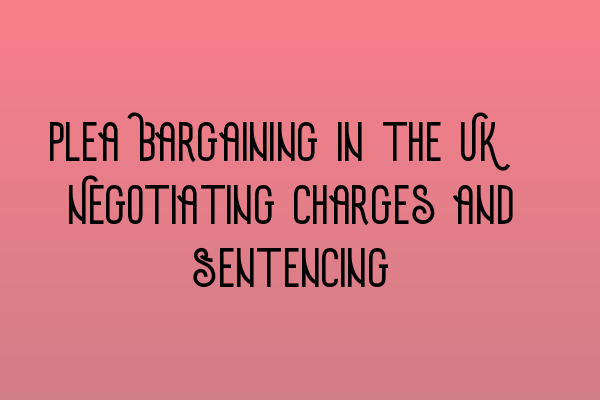Plea Bargaining in the UK: Negotiating Charges and Sentencing
Welcome to SQE Criminal Law & Practice Law UK! In this blog post, we will explore the concept of plea bargaining in the UK and delve into the intricacies of negotiating charges and sentencing. With our expertise in criminal law, we aim to provide you with comprehensive information on this important aspect of the legal system.
Understanding Plea Bargaining
Plea bargaining is a legal process where the prosecutor and the defense negotiate an agreement. The defendant agrees to plead guilty to a lesser charge or to fewer charges in exchange for a more lenient sentence or the dismissal of other charges. This process allows for a potential resolution without going to trial, saving both time and resources.
In the UK, plea bargaining is commonly practiced in criminal proceedings, although its use can vary depending on the nature of the case and the discretion of the prosecution. It is crucial for solicitors and legal professionals to understand the intricacies of plea bargaining to effectively represent their clients and achieve the best possible outcome.
The Benefits of Plea Bargaining
There are several benefits associated with plea bargaining:
- Reduced Charges: By negotiating a plea bargain, a defendant may be able to have their charges reduced to lesser offenses, potentially resulting in a less severe sentence.
- Avoidance of Trial: Going to trial can be a costly and time-consuming process. Plea bargaining allows for a quicker resolution, saving both the court’s time and the taxpayer’s money.
- Control over Outcome: Rather than leaving the decision solely in the hands of a judge or jury, plea bargaining gives both the prosecution and the defense the opportunity to have a say in the outcome of the case.
The Process of Plea Bargaining
The process of plea bargaining typically involves the following steps:
- Consultation: The defense attorney meets with the client to discuss the case, gather evidence, and assess the strengths and weaknesses.
- Negotiation: The defense attorney engages in negotiations with the prosecutor to explore the possibility of a plea bargain.
- Agreement: If a plea bargain is reached, both parties present the agreement to the court for review and approval.
- Court Appearance: The defendant appears in court to enter their plea and have the plea bargain presented to the judge.
- Sentencing: If the plea bargain is accepted, the judge will determine the appropriate sentence, taking into account the agreed-upon terms.
Plea bargaining requires skillful negotiation and a thorough understanding of the law. Solicitors must carefully weigh the evidence and advise their clients on the potential benefits and risks associated with accepting a plea bargain.
Utilizing Plea Bargaining to Your Advantage
At SQE Criminal Law & Practice Law UK, we offer comprehensive courses and preparation materials to help you excel in your legal career. Whether you are preparing for the SQE 1 or SQE 2 exams, we have the resources you need to succeed:
- SQE 1 Practice Exam Questions
- SQE 1 Practice Mocks FLK1 FLK2
- SQE 2 Preparation Courses
- SQE 1 Preparation Courses
- SRA SQE Exam Dates
By investing in professional development and staying up to date with legal practice, you can enhance your abilities as a solicitor and provide excellent legal services to your clients.
In conclusion, plea bargaining plays a significant role in the UK legal system, offering a means to resolve certain criminal cases outside of trial. It is essential for solicitors and legal professionals to understand the process and potential advantages associated with plea bargaining. At SQE Criminal Law & Practice Law UK, we are committed to providing the resources you need to excel in your legal career.
